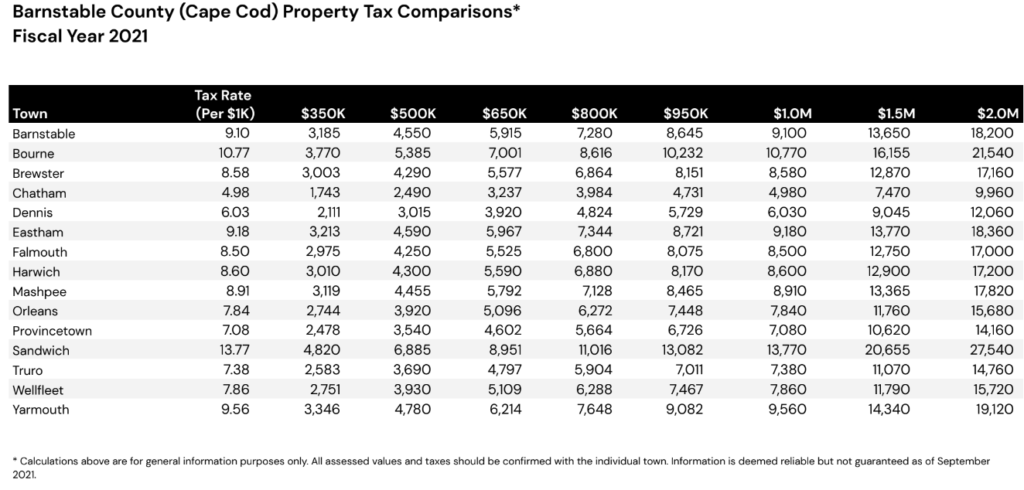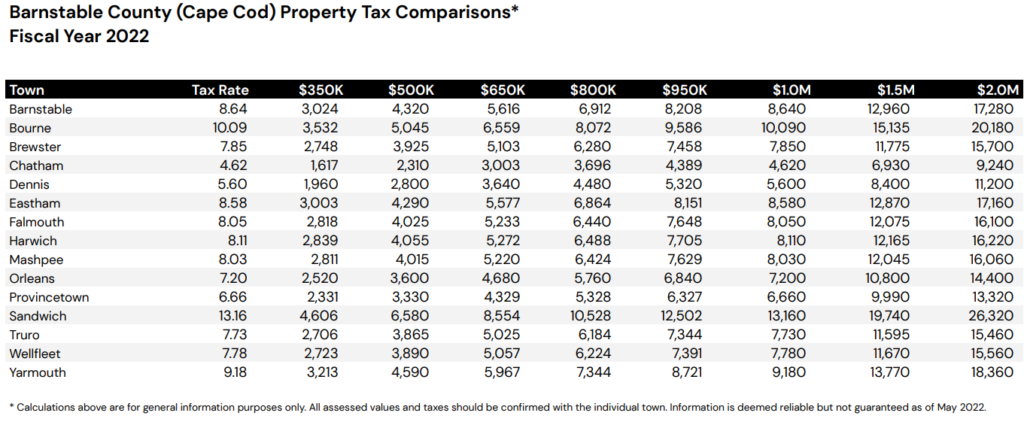
Property taxes make up a big chunk of the total tax burden for homeowners, so it pays to have an understanding of this tax. Certainly, we need funding for public services and infrastructure, which are funded by property taxes, but no one wants to overpay. A good way to ensure you aren’t surprised by your tax bill and aren’t overcharged on your property tax is by understanding how property taxes are assessed. Here, then, are the property tax basics for Cape Cod homeowners.
Property Tax Overview
Based on the value of real property, property tax is almost exclusively the purview of municipal governments, which receive their authority to levy property tax from Massachusetts state law. Property taxes are used to help finance local government, funding shared resources that individual property owners couldn’t reasonably procure on their own such as police, public schools, and fire protection.
In fact, this kind of tax is one of the oldest forms of taxation in the United States, and actually has its roots in ancient Egypt, Persia, and China. Before income and sales taxes, local governments used property-based taxes to finance most of their activities. Property taxes remain a major source of revenue for local governments.
If you’re wondering how your property tax is calculated, it is tied directly to the value of your property. This includes both the land and the buildings on it. Locally on Cape Cod, you should assume that the local tax assessor will reassess your property immediately after a sale closes. Typically, tax assessors will slowly increase the assessed property values year over year to keep up with inflation. Assessors then charge the owner-of-record the appropriate tax using the standards set by the taxing authority. Assessors calculate the total tax using the mill levy–also called the millage tax–and the assessed property value.
What do you get in return for the money you pay in property tax? Although it varies according to location, it’s typically things like education, road construction, street maintenance, law enforcement, fire departments, and so on.
Of course, these services benefit all residents, but property taxes can be extremely burdensome for individual homeowners. In addition, taxes tend to rise steadily over time. Even after you pay off your mortgage, the tax bills keep coming.


How Your Tax Is Assessed
Now let’s see exactly how your property tax is calculated . . .
The short version is that property taxes are calculated by taking the mill levy and multiplying it by the assessed value of the owner’s property. The mill levy is the tax rate levied on your property value, with one mill representing one-tenth of one cent. So, for $1,000 of assessed property value, one mill would be equal to $1. But let’s dig a little deeper into the “assessed value” part of the equation.
The assessed value of your property is an estimation of the reasonable market value based on the prevailing local market conditions . . . sort of. The assessor will review all relevant information surrounding your property to estimate its overall value. To give you the most accurate assessment, the assessor must look at what comparable properties are selling for under the current market conditions, how much the replacement costs for the property would be, the maintenance costs for the property owner, any improvements that were completed, any income you are making from the property, and how much interest would be charged to purchase or construct a property comparable to yours. In addition, the assessors will use the sale of your home as an opportunity to reassess the value of your Cape Cod home.
Typically, assessors estimate property value by means of one or more of three methods. These are . . .
- Sales evaluation – Much as your agent would perform a Comparative Market Analysis (CMA), the assessor values the property using comparable sales in the area. Criteria include location, the state of the property, any improvements, and the overall market conditions. The assessor then makes adjustments in the figures to show specific changes to the property, such as new additions and renovations.
- Cost method – This is a valuation method base on replacement cost, which also factors in depreciation for older homes. For newer properties, the assessor deducts any realistic depreciation and looks at the costs of building materials and labor, including these figures in the final value of the property.
- Income method – This method is based on how much income you could make from the property if it were rented. Using the income method approach, the assessor considers the costs of maintaining the property, managing the property, insurance, and taxes, as well as the return you could reasonably anticipate from the property. After determining the market value of the property, the assessed value is calculated by taking its actual value and multiplying it by an assessment rate.
Disputing Your Tax Bill
As you can see, there is room for error in these assessment methods. So if you think the assessed value of your home – and, as a consequence, the tax you are asked to pay – is too high, you can dispute your property tax bill, also called an abatement. Here is how to proceed . . .
Call your city’s assessor’s office and request a property tax dispute form. When filling out the form, be as specific as you can. The assessor may ask to perform an in-home inspection. If the assessor believes you have a legitimate complaint, they may choose to lower your assessed value or schedule an official hearing where you can explain the issue in person. After the hearing, the assessor’s office will either decide in your favor or explain why their assessment is justified.
Keep in mind that you need to prepare for this hearing. It’s also a good idea to work with an experienced local real estate agent who can provide expertise on other home assessments in your area. To discover more about how a Cape Cod agent can assist you with property tax abatement, just call (508) 314-6098.
Lowering Your Tax Bill
There are also some things homeowners in Cape Cod can do to keep their property tax bill as low as possible. These include . . .
- Not building or adding on – Any structural changes to a home or property will increase your tax bill. A deck, a pool, a large shed, or any other permanent fixture added to your home is presumed to increase its value.
- Limiting curb appeal – Tax assessors work from strict guidelines, but they still have some subjective leeway when assessing. So the more attractive your property looks, the more likely it is to be valued and taxed for more.
- Accompany the assessor – Many people allow the tax assessor to wander about their homes unguided during the evaluation process. This can be a mistake. Some assessors will only see the good points in the home such as the new fireplace or marble-topped counters in the kitchen. They’ll overlook the fact that several appliances are out of date, or that some small cracks are appearing in the ceiling. When walking through with a Cape Cod property tax assessor, you are essentially hoping for a lower assessed value.
Consult a Cape Cod Agent
Property taxes are a pretty complex affair, but can be easily understood with a bit of guidance. Most homeowners or prospective Cape Cod homebuyers would benefit from the expertise of an experienced local Cape Cod Realtor. So if you have any property tax concerns, contact us today at (508) 314-6098.

